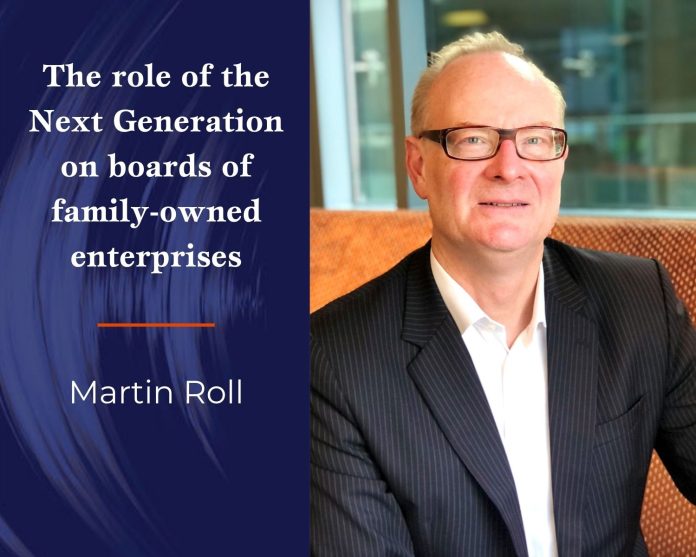The podcast and the article are brought to you by The Better Boards Podcast Series.
Transferring a family-owned enterprise to the next generation raises complex and emotionally charged questions. A Chinese proverb states that “wealth shall not pass three generations.” The first generation builds wealth, the second manages it, and the third generation destroys it.
Founders and generations after them also have obligations to fulfill to ensure successful succession to the next generations. The challenge often arises when the next generation takes over from the founder or multiple generations who personally poured everything into the business. In contrast, the next generation tends to have less of an emotional connection to the business.
This 3-part podcast series looks at different angles at boards, governance, and related topics in family-owned enterprises. In this episode, we will focus on the next generation’s role on boards of family-owned enterprises.
In this podcast, Dr Sabine Dembkowski, Founder and Managing Partner of Better Boards, discusses the role of the next generation with Martin Roll, a global expert on family business and family office topics and a world-renowned C-level advisor and business school educator. He mentored over 650 Next Generation Family members and understands what keeps them awake at night.
“Next Gen X-ers can bridge past, present and future”
Martin introduces how the combination between family and business is unique. The family brings values, legacy, passion, entrepreneurship, and, first and foremost, very personal involvement to business. He believes that the next generations in family businesses can play the roles of change agents and have three distinct roles to play. They can work in the business, serve on the board (or supervisory board) and/or become a responsible owner. Naturally, these different roles can change over time, and often someone might start to work in the business when young, later serve on the board, and eventually be an owner of the business, for example. But Martin notes that involvement needs to fit with their personality, skills, and interest because this is a long-term commitment. Overall, he believes the role of the next generation is renewal, and to be the voice of the new generation, modern customers and competition. They understand the legacy because they are family, but they can be change agents to make sure the family enterprise continues being successful. He notes that younger entrants to the business should bring as much as possible to the table and essentially be the ‘new voice’ with a global outlook and savviness in digital and technology. Next-generation leaders should question the established norms and structures, but he cautions that coming in, you do not need to create a revolution in the firm but to ensure constant renewal and fit for purpose.
“Make sure you clean up the shop in every generation, don’t pass on the laundry”
Martin believes bringing Next Gen family members into the business starts with creating the invitation to join or to be involved. This can be difficult, with different expectations and possible tensions across generations. The senior generation in succession planning needs a protagonist to allow the Next Gens to have a voice, opinion, and perspective.
He notes some stumbling blocks for the Next Gen, such as their mandate, role, authority, and autonomy. He cautions that the issue of when to step aside and a retirement date can be very difficult for seniors. Only 15% of family businesses worldwide have a plan for succession in place, and yet it takes at least 5-7 years in most cases to do succession. This is where boards have a huge role in mediating, asking sensitive questions, guiding, and nurturing succession over time.
Martin notes that succession is not a standard formula because every family is unique with their own. There needs to be a resolution of current tensions, unsolved issues, ownership disputes, etc, so they are not passed on to the next generation.
“Outside directors on family business boards have a huge role to play”
Martin outlines the role outside directors have as directors of all generations – not only the senior generation on the board but also the younger generation coming in. They can provide mentorship and facilitate, creating a formal and informal relationship with the Next Gens entering new roles. This is because outside directors lack the family biases and tensions, and although aware of the family issues, they can act as an independent voice to help communicate across the generation gap if one exists. They can also be a toolbox for board work, compliance, governance, and best practices and inspire the Next Gen.
The three top takeaways from our conversation are:
- Succession is one of the most complex matters in a family business, so planning should start early to ensure the next generation is in place when needed and desired.
- Remember that next-generation members bring renewal, so directors can influence how to integrate them, onboard them and help to mentor them.
- The next generation brings continuity, and they are the ones that will make sure the legacy carries on. The board should help the long-term competitiveness and relevance of the family business and help to unlock that passion.
Don’t forget to subscribe never to miss an episode of the Better Boards Podcast Series. Available on their website, Apple, Spotify or Google.
To find out how you can participate in the Better Boards Podcast Series or more information on Better Boards’ solutions, please email us at [email protected].


























![“Does Everyone Hear Me OK?”: How to Lead Virtual Teams Effectively iStock-1438575049 (1) [Converted]](https://www.europeanbusinessreview.com/wp-content/uploads/2024/11/iStock-1438575049-1-Converted-100x70.jpg)





